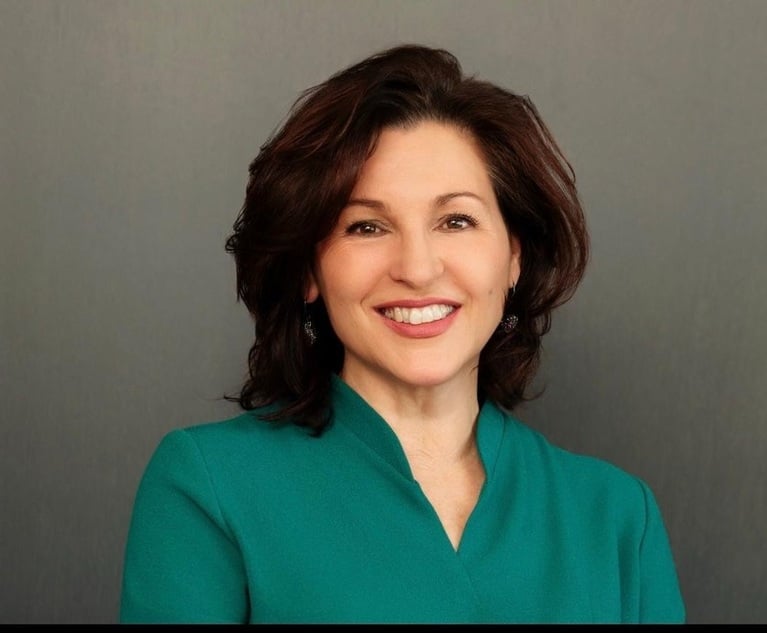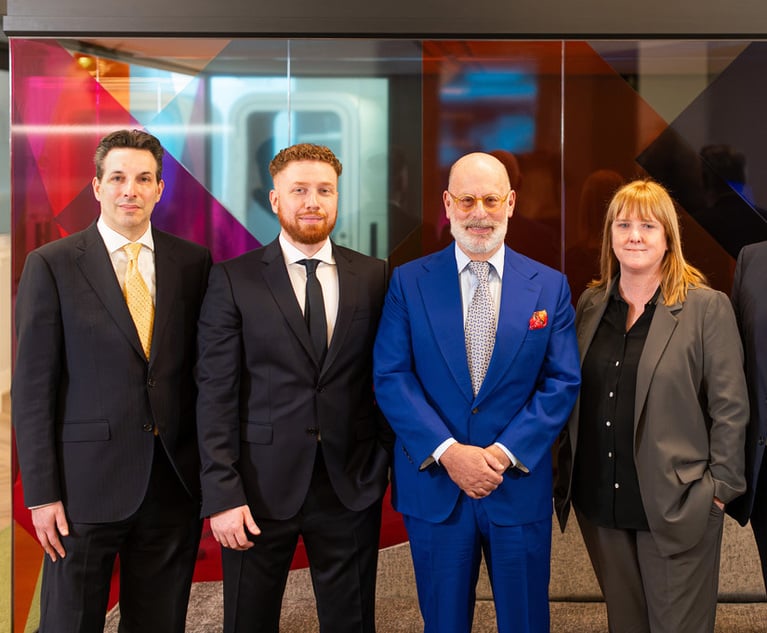More Big Law Firms Respond as the Coronavirus Continues to Spread Globally
The virus, officially known as COVID-19, has now spread to 47 countries and has infected at least 82,000 people.
February 27, 2020 at 07:18 PM
7 minute read
The original version of this story was published on The American Lawyer
 Credit: Shutterstock.com
Credit: Shutterstock.com
More law firms are taking precautions to protect their attorneys and clients from contracting and spreading the coronavirus, officially called COVID-19, which has now spread to 47 countries and has infected at least 82,000 people.
World leaders have responded by issuing travel restrictions and closing down public spaces. On Thursday, Japanese Prime Minister Shinzo Abe said that he will request all elementary, junior high and high schools across Japan to close temporarily, starting March 2, in an attempt to stop the spread of the virus in Japan.
For now, many firms are responding in much the same way.
Shearman & Sterling has issued a travel ban for China and Hong Kong. The New York-based firm is seeking to limit lawyers' non-essential travel to Italy, Japan and South Korea, said senior partner David Beveridge. It has put remote working measures in place in Asia and Italy, where lawyers and staff are working outside the office.
"We monitor the situation, and as things change, we're implementing new measures," he said, adding he was scheduled to be in Asia next week but had to postpone the trip. "We're managing it fairly well."
The impact on business has varied, he said, noting that a colleague in Asia still has new deals coming in but there's been some effect in areas where meetings are delayed. "It's too early to tell," he said.
Dorsey & Whitney has encouraged its 17 attorneys, plus staff, from its offices in Beijing, Shanghai, and Hong Kong to work remotely in light of the outbreak.
"Don't come in if you're feeling ill at all, obviously, number one, but don't come in if things in your region or in your neighborhood or your transportation modes or something makes you feel vulnerable, then work remotely," managing partner William Stoeri said, adding that the firm has distributed laptops to both its lawyers and its administrative staff.
Sullivan & Cromwell chair Joseph Shenker told its attorneys to check with managing partners or office directors if they have travel plans to any of the countries on the Centers for Disease Control 's travel advisory list, including China, South Korea, Italy, and Japan, according to an internal memo.
"If you have travel booked to any of these areas, please coordinate with the appropriate managing partner or office director listed below. Travel to locations may require you, upon your return, to self-quarantine away from your work location for a period of time…" Shenker wrote.
Sullivan & Cromwell did not respond to requests for comment.
Morgan, Lewis & Bockius said many of its lawyers in Asia have been working remotely since the outbreak began. The firm added that remote working arrangements are available to associates as well as partners, and it is shipping supplies directly to its offices in Asia. It also has restricted non-essential travel.
Baker McKenzie has also limited non-essential travel and has implemented "remote working protocols," according to a spokesperson.
But not all firms have closed their offices. After a temporary shut-down, Faegre Drinker Biddle & Reath has re-opened its offices in Shanghai and Beijing. And as of Thursday, Hogan Lovells had not closed its office in Milan, Italy, a country that has reported more than 600 cases of coronavirus, although employees can work remotely if they "have concerns." Its offices in Asia are also still open. The firm has tamped down on travel, however.
"Only essential travel in exceptional circumstances is permitted to and from China and South Korea. We are asking our people to avoid traveling to and from Milan, Iran, and Japan for the time being. If they do go there then they should follow the relevant medical advice," a firm spokesperson said.
Pillsbury Winthrop Shaw Pittman has not closed its offices in Hong Kong, Shanghai, Taipei and Tokyo though the firm has sent respirator masks from the U.S. to help protect its attorneys and staff, said Kathleen Pearson chief human resources officer at Pillsbury.
The firm hasn't officially instituted travel restrictions either, but has told attorneys traveling back from countries designated by the CDC as high risk — China and South Korea — to self-quarantine at home for at least 14 days.
Law.com and Law.com International previously reported that Paul, Weiss, Rifkind, Wharton & Garrison is suspending non-essential business travel to and from Mainland China, Hong Kong, South Korea, Japan and Italy. And after the virus spread in Northern Italy, many global law firms said they closed their Milan offices or are encouraging lawyers and staff there to work remotely. Law firms in France are also taking precautions and preparing for the worst. And as of early February, Dentons temporarily closed its office in Wuhan, China, where the virus originated.
Even in New York City, where, as of Thursday no one had tested positive for the virus, some law firms are taking precautions. Latham and Watkins sent out an email Thursday evening notifying recipients that it was canceling its March 5 client reception at the American Museum of Natural History.
"Out of an abundance of caution and after careful consideration for the health and well-being of our clients and colleagues, we have made the decision due to the uncertain conditions surrounding the COVID-19 outbreak."
Travel and remote working aren't the only methods firms are employing to protect its attorneys from coronavirus.
Pillsbury has ordered hand sanitizer stations for all of its offices, boosted its IT capabilities in case all of its U.S. attorneys need to work from home, and partnered with the San Fransisco-based organization GlobalSF to help send respirator masks to Asian cities afflicted by the coronavirus.
Orrick, Herrington & Sutcliffe has told partners it will not be holding a planned retreat in San Antonio, Texas due to coronavirus concerns. Norton Rose Fulbright and Baker Botts are excluding Asia-based attorneys from their partner meetings. And Duane Morris canceled its Asia partners meeting, which was scheduled to take place within the next month.
In Shanghai, Quinn Emanuel Urquhart & Sullivan and Squire Patton Boggs are paying for employees to take taxis rather than public transport if it is necessary for them to travel to the office, Law.com International reported late last month.
The virus has now reached 47 countries infecting at least 82,000 people and killing more than 2,800 as of Thursday. The CDC announced on Wednesday that at least 60 Americans have contracted the virus, and has advised travelers to refrain from travel to China and South Korea.
The CDC also has advised people to prepare for the outbreak as they would prepare for a natural disaster: Stock up on water, non-perishable goods and respiratory masks.
Lizzy McLellan, Lisa Shuchman, Christine Simmons, David Thomas and Anna Zhang contributed to this report.
Read More:
Paul Weiss Restricts Travel, Orrick Postpones Partner Retreat Over Coronavirus Fears
Dentons Vacates Wuhan Office as Law Firms Restrict Travel to Mainland China
Law Firms Shut Milan Offices as Coronavirus Disruption Spreads
This content has been archived. It is available through our partners, LexisNexis® and Bloomberg Law.
To view this content, please continue to their sites.
Not a Lexis Subscriber?
Subscribe Now
Not a Bloomberg Law Subscriber?
Subscribe Now
NOT FOR REPRINT
© 2025 ALM Global, LLC, All Rights Reserved. Request academic re-use from www.copyright.com. All other uses, submit a request to [email protected]. For more information visit Asset & Logo Licensing.
You Might Like
View All
Hengeler Advises On €7B Baltica 2 Wind Farm Deal Between Ørsted and PGE
2 minute read

A&O Shearman To Lose Another Five Lawyers, Including Madrid Practice Head, to EY
3 minute read
Rosenblatt Breaks Away From RBG, Becomes 40-Strong Standalone Firm
Law Firms Mentioned
Trending Stories
- 1'Careless Execution' of Presidential Pardons Freed Convicted Sex Trafficker, US Judge Laments
- 2Newsmakers: Littler Elevates Dallas Attorney to Shareholder
- 3South Florida Real Estate Lawyers See More Deals Flow, But Concerns Linger
- 4General Counsel Accused of Destroying Evidence
- 52,000 Docket Entries: Complex South Florida Dispute Sets Precedent
Who Got The Work
J. Brugh Lower of Gibbons has entered an appearance for industrial equipment supplier Devco Corporation in a pending trademark infringement lawsuit. The suit, accusing the defendant of selling knock-off Graco products, was filed Dec. 18 in New Jersey District Court by Rivkin Radler on behalf of Graco Inc. and Graco Minnesota. The case, assigned to U.S. District Judge Zahid N. Quraishi, is 3:24-cv-11294, Graco Inc. et al v. Devco Corporation.
Who Got The Work
Rebecca Maller-Stein and Kent A. Yalowitz of Arnold & Porter Kaye Scholer have entered their appearances for Hanaco Venture Capital and its executives, Lior Prosor and David Frankel, in a pending securities lawsuit. The action, filed on Dec. 24 in New York Southern District Court by Zell, Aron & Co. on behalf of Goldeneye Advisors, accuses the defendants of negligently and fraudulently managing the plaintiff's $1 million investment. The case, assigned to U.S. District Judge Vernon S. Broderick, is 1:24-cv-09918, Goldeneye Advisors, LLC v. Hanaco Venture Capital, Ltd. et al.
Who Got The Work
Attorneys from A&O Shearman has stepped in as defense counsel for Toronto-Dominion Bank and other defendants in a pending securities class action. The suit, filed Dec. 11 in New York Southern District Court by Bleichmar Fonti & Auld, accuses the defendants of concealing the bank's 'pervasive' deficiencies in regards to its compliance with the Bank Secrecy Act and the quality of its anti-money laundering controls. The case, assigned to U.S. District Judge Arun Subramanian, is 1:24-cv-09445, Gonzalez v. The Toronto-Dominion Bank et al.
Who Got The Work
Crown Castle International, a Pennsylvania company providing shared communications infrastructure, has turned to Luke D. Wolf of Gordon Rees Scully Mansukhani to fend off a pending breach-of-contract lawsuit. The court action, filed Nov. 25 in Michigan Eastern District Court by Hooper Hathaway PC on behalf of The Town Residences LLC, accuses Crown Castle of failing to transfer approximately $30,000 in utility payments from T-Mobile in breach of a roof-top lease and assignment agreement. The case, assigned to U.S. District Judge Susan K. Declercq, is 2:24-cv-13131, The Town Residences LLC v. T-Mobile US, Inc. et al.
Who Got The Work
Wilfred P. Coronato and Daniel M. Schwartz of McCarter & English have stepped in as defense counsel to Electrolux Home Products Inc. in a pending product liability lawsuit. The court action, filed Nov. 26 in New York Eastern District Court by Poulos Lopiccolo PC and Nagel Rice LLP on behalf of David Stern, alleges that the defendant's refrigerators’ drawers and shelving repeatedly break and fall apart within months after purchase. The case, assigned to U.S. District Judge Joan M. Azrack, is 2:24-cv-08204, Stern v. Electrolux Home Products, Inc.
Featured Firms
Law Offices of Gary Martin Hays & Associates, P.C.
(470) 294-1674
Law Offices of Mark E. Salomone
(857) 444-6468
Smith & Hassler
(713) 739-1250








